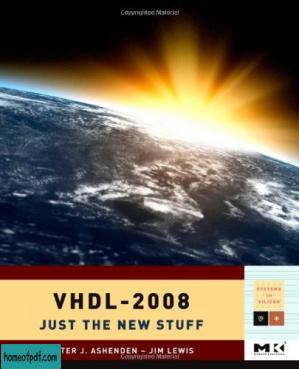VHDL 2008: Just the New Stuff (Systems on Silicon) 电子书下载
As the title says, this presents only the deltas from the previous version of the spec. If you`re not already reasonably conversant with VHDL, this won`t do a thing for you. But, if you`ve used VHDL long enough to be utterly maddened by some of its shortcomings, get this one. You`re in for some happy surprises.
The two biggest changes have to do with generics and with assertions. Since day one, logic designers have treated strongly-typed VHDL as an untyped language. We`ve had to cast everything to bitvectors, like a PL/I programmer who uses unspec for everything, because of inflexible typing. A FIFO, for example, that handled one data type could never be reused with a different type. You`d have rewrite the entire FIFO, identical in every way, except for the data type. Yuk - better to cast everything to std_logic_vector, reuse the component, and adopt the old C-language slogan: "strong typing is for weak memories." Generic types, more like C++ templates, get past that. Generic subprograms increase reusability, too. If you`re new to the concept, it`s like passing a function as parameter, but at compile time. In the world VHDL addresses, compile-time binding is just fine.
Much has been made of SystemVerilog assertions - and with good reason. They add a huge level of expressiveness to the verification engineer`s task, and represented a real advance over what VHDL had. The gap closes with VHDL`s integrated PSL. I haven`t done a point by point comparison, but SV assertions and PSL appear to have closely comparable feature sets. That includes Verilog`s scope-busting ability to reach internal signals deep down in the structure hierarchy, but PSL allows up-level references, too.
VHDL 2008 also includes minor features that scratch many itches from the previous standards: ability to use std_logic values as "if" tests without casting to boolean, conditional assignments in sequential blocks, bitwise reduction operators, and fixes to other niggling annoyances that people have been coding around for years.
The one thing conspicuous by its absence is mention of what`s in the synthesizable subset. Using advanced features in testbenches is nice. But, if you can`t put them in the payload logic, they tend to create impedance mismatch where the application plugs into the test harness. Also, one of VHDL`s big advantages has been its formally standardized synthesizable subset. That meant you could code for one tool suite and have some assurance that your work would port to other tools, too. Without that kind of contract for reusability, the new features (especially richer generics) will never live up to their promise.
This book is just a stopgap, and will become obsolete once complete VHDL references include the new features. Those books aren`t out yet, however, and this is. For now, I recommend this highly to anyone who uses or develops VHDL tools.
-- wiredweird
尊敬的读者:
欢迎您访问我们的网站。本站的初衷是为大家提供一个共享学习资料、交换知识的平台。每位用户都可以将文件上传至网盘并分享。
然而,随着用户上传的资料增多,我们发现部分不宜或版权问题的书籍被分享到了本站。
为此,我们已经关闭了分享入口,并进行了多次书籍审查,但仍有部分内容未能彻底审查到位。
在此,我们恳请广大读者与我们共同监督,如发现任何不宜内容,请 点击此处 进行举报,我们会第一时间处理并下架相关内容。
希望我们能共建一个文明社区!感谢您的理解与支持!
猜你喜欢
- 《美国大外交》乔治•F.凯南60周年纪念版 电子书下载
- MATLAB 科学计算 - Alfio Quarteroni and Fausto Saleri 著 李敏波 译 电子书下载
- Surviving The App Store - Amir Rajan 电子书下载
- Social Software and Web 2.0 Technology Trends - P. Candace Deans 电子书下载
- 《莎士比亚十四行诗集》威廉·莎士比亚全译修订版 电子书下载
- 《聪明人极简图表工作法》高桥政史经典版 电子书下载
- 《爸爸回家做功课》 欧阳龙文字版 电子书下载
- Mastering Shiny - Hadley Wickham 电子书下载
- 《放学后》[日]东野圭吾作品南海出版公司中文版 电子书下载
- Building Microservices 2nd Edition - Sam Newman 电子书下载
- 《我们与祖先交谈的夜晚》 [德]萨沙·斯坦尼西奇 电子书下载
- 《复旦博学-金融学系列:国际金融新编(第5版)》姜波克珍藏版 电子书下载












